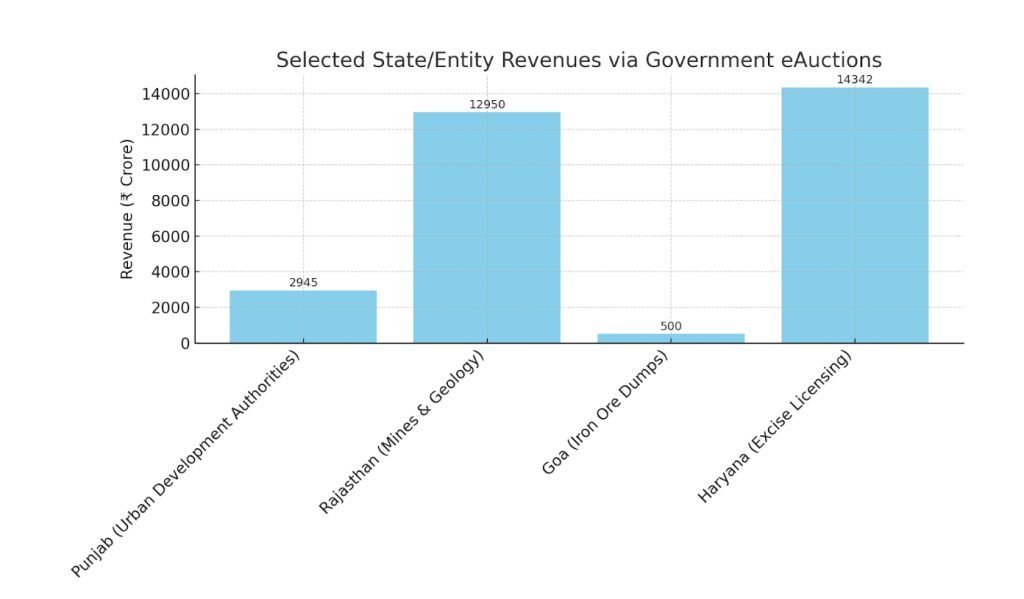Policy Update
Siddharth
Background
Conceived as part of India’s Digital India mission, the Government eAuction System is a centralized, fully digital platform created by the National Informatics Centre (NIC) under the Ministry of Electronics & Information Technology. The portal allows central and state departments, municipalities, housing boards, and other agencies to conduct auctions. These auctions include land, property, mining rights, service contracts, and disposal of unserviceable materials. This process is transparent, efficient, and paperless. The system replaces traditional in-person auctions with a digital alternative, increasing access and improving outcomes of auctions

Source – https://eauction.gov.in/eauction/#/
Functioning
From bidder registration to awarding, the eAuction platform makes sure that every step happens online. Registered users can browse active auctions, place bids, watch the competition in real time, and make secure online payments all within the NIC-managed system. The process follows pre-set criteria and runs automatically, reduce the chances of bias or manual intervention.
In addition to being transparent, the platform protects data integrity and confidentiality. It allows users to upload and verify documents digitally and produce results that are ready for an audit.
Performance
While consolidated national-level statistics remain limited, state-level outcomes demonstrate powerful results:
- In Punjab, urban development authorities raised ₹2,945 crore through the e-auction of various land parcels, including residential, commercial, multiplex, and group housing sites. This indicates strong demand and effective monetization of public assets.
- Rajasthan’s Department of Mines and Geology recently launched e-auctions for 22 major mineral blocks. They aim to surpass their previous record by tapping into new revenue sources. The state set a target of over ₹12,950 crore for FY 2025-26 after achieving ₹9,228 crore in FY 2024-25. This represents a 23.65% increase from the year before.
- Goa plans to generate ₹400-500 crore by auctioning off “unclaimed” iron ore dumps through e-auctions, turning idle land into revenue.
- Haryana used the platform for excise licensing, earning ₹14,342 crore through e-auctions of liquor vend zones. This amount is more than double the previous year’s ₹7,025 crore. It shows how online auctions can significantly boost government revenue in regulated sectors.
- In Uttar Pradesh, new guidelines under the MSME Industrial Estate Management Policy 2025 aim to lease industrial plots through e-auctions. This includes structured pricing starting at ₹2,000-3,000 per sq m, earnest money deposits, and 5% annual increases. This is a major effort to turn underperforming industrial estates into revenue-generating assets.
- In mining, the Union Ministry of Mines conducted a significant offshore e-auction of 13 mineral blocks, including polymetallic nodules and construction sand. This signifies India’s entry into auction-based commercialization of offshore mineral resources. It also supports broader goals of critical mineral security and sustainable development.


Impact
The cumulative effects of e-auctions are multi-fold:
- Revenue Enhancement: Across diverse sectors including real estate, mining, the excising system has enabled significant revenue gains, sometimes placing states on high-growth trajectories.
- Transparency and Efficiency: Features like real-time bidding, digital audit trails, and automated winner selection ensure equitable and accountable processes, reducing the potential for favoritism and malpractice.
- Asset Utilization: Idle or under-utilized public property and mineral blocks are increasingly being leveraged optimally through e-auction mechanisms.
- Inclusive Participation: Online auctions allow broader bidder participation including MSMEs and remote bidders expanding competition.
Emerging Issues
The Government eAuction System, developed and managed by the National Informatics Centre (NIC) under the Ministry of Electronics & Information Technology, is a critical component of India’s growing Digital Public Infrastructure (DPI) framework. Much like Aadhaar enabled universal digital identity, UPI revolutionized real-time payments, and ONDC is reshaping e-commerce, the eAuction system brings transparency, efficiency, and inclusivity to government asset allocation and disposal. Conceived under the Digital India mission, it ensures that auctions whether for land, property, services, or natural resources are conducted in a standardized, paperless, and technology-driven manner.
Way Forward
Realizing the full potential of the Government eAuction System will require a set of strategic improvements focused on improving accessibility, efficiency, and trust. Strengthening the platform’s scalability and ensuring it is mobile-friendly can greatly increase system reliability. Targeted outreach and training programs in semi-urban and rural areas will help broaden participation and encourage MSME involvement.
Creating a unified, publicly accessible dashboard to track auction volumes, revenues, categories, and regional trends could improve transparency and provide useful insights for policymakers. Including tools like AI-driven fraud detection and bidding analytics would further build trust and protect the integrity of the process. Finally, integrating e-auction mechanisms into sector policies such as those for industry, urban development and mining can help make their use more common, as shown by Uttar Pradesh’s MSME industrial plots policy and the Union Ministry of Mines’ offshore mineral auctions.
References
Business Standard. (2024, November 28). Goa govt eyeing Rs 500 cr revenue via e-auction of unclaimed iron ore dumps.
https://www.business-standard.com/industry/news/goa-govt-eyeing-rs-500-cr-revenue-via-e-auction-of-unclaimed-iron-ore-dumps-124112800711_1.html
Indian Institute of Management Bangalore. (2019). E-auctions in land markets: Evidence from Bengaluru (Working Paper No. 593).
https://www.iimb.ac.in/sites/default/files/2019-09/WP%20No.%20593.pdf
Moneycontrol News. (2025, February 5). Punjab urban development authorities raise Rs 2,945 cr from e-auction of land parcels.
https://www.moneycontrol.com/news/india/punjab-urban-development-authorities-raise-rs-2945-cr-from-e-auction-of-land-parcels-12824248.html
Times of India. (2025, January 30). Haryana wraps up auction of liquor zones, earns Rs 14,342 crore in revenue.
Haryana wraps up auction of liquor zones, earns Rs 14,342 crore in revenue | Chandigarh News – Times of India
About the Contributor
Siddharth is currently pursuing his B.Tech from IIT (ISM) Dhanbad. He is affiliated with IMPRI as a Policy Research Intern, with prior experience in policy analysis, fundamental financial analysis and energy exploration projects. His core interests include energy policy, mining operations, sustainable resource management, and international relations.
Acknowledgment
The author extends sincere gratitude to Ms. Aasthaba Jadeja for her invaluable guidance and mentorship throughout the research process.
Disclaimer: All views expressed in the article belong solely to the author and not necessarily to the organisation.



















